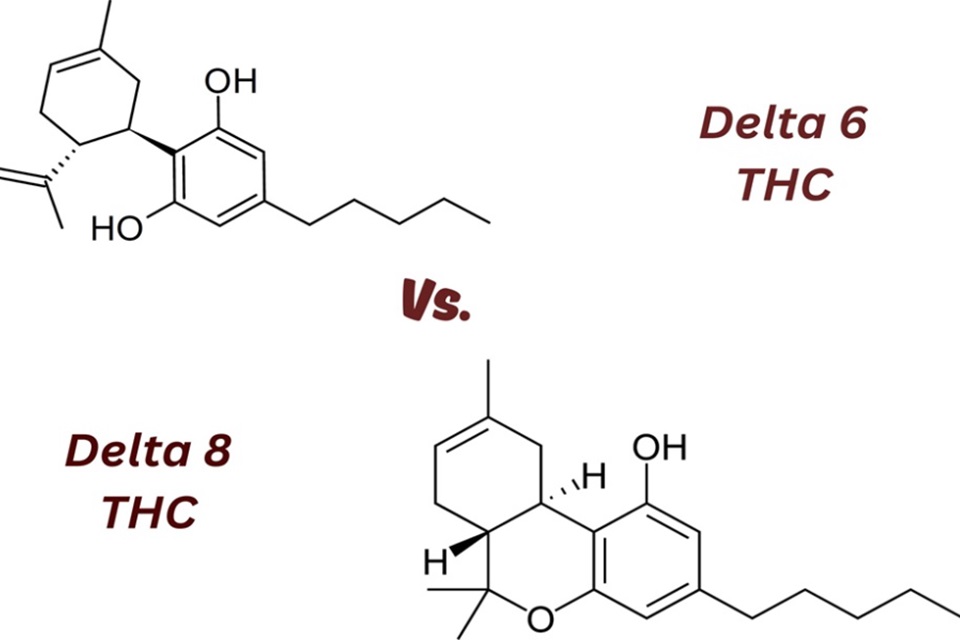Delta 6 Vs. Delta 8: Know The Difference, Effects, Molecular Structure & More
The world of cannabinoids is vast and ever-evolving, with various compounds offering different effects and benefits. Two such compounds that have gained attention are Delta 6 THC and Delta 8 THC. Understanding the differences between these cannabinoids can help consumers make informed decisions about their usage. This article explores the distinctions, effects, molecular structures, and more of Delta 6 and Delta 8 THC.
What Is Delta 6 THC?
Delta 6 THC, also identified as Delta-6-tetrahydrocannabinol, is a less widely recognized cannabinoid present in the cannabis plant. It is among the numerous isomers of THC, the main psychoactive component in cannabis. Despite not being as widely used as Delta 9 THC (the most common variant of THC), Delta 6 THC possesses its distinct characteristics and potential advantages.
Molecular Structure
The molecular structure of Delta 6 THC is similar to other THC isomers but with slight differences. Delta 6 THC has a double bond on the sixth carbon atom in its chain. This subtle change in the location of the double bond differentiates it from other THC isomers like Delta 8 and Delta 9, affecting its interaction with the body’s endocannabinoid system and resulting in distinct effects.
Extraction Method
Extracting Delta 6 THC involves isolating it from the cannabis plant using advanced techniques. One common method is through distillation, where cannabis extract is heated and condensed to separate Delta 6 THC. Another method is isomerization, where other cannabinoids, such as CBD, are chemically altered to convert them into Delta 6 THC.
Products Made With Delta 6 THC
Delta 6 THC can be found in various products, including tinctures, edibles, vape cartridges, and concentrates. These products cater to consumers looking for the specific effects of Delta 6 THC, offering a different experience compared to other THC variants.
Effects
The effects of Delta 6 THC are still being studied, but anecdotal evidence suggests it provides a mild psychoactive experience. Users report feeling relaxed and slightly euphoric without the intense high associated with Delta 9 THC. This makes Delta 6 THC a potential option for those seeking the benefits of THC without overwhelming psychoactivity.
What Is Delta 8 THC?
Delta 8 THC, or Delta-8-tetrahydrocannabinol, is another isomer of THC. It is more well-known and widely available compared to Delta 6 THC. Delta 8 THC offers a middle ground between the intense effects of Delta 9 THC and the mild effects of Delta 6 THC, making it a popular choice among cannabis users.
Molecular Structure
Delta 8 THC’s molecular structure is characterized by a double bond on the eighth carbon atom. This structural feature sets it apart from Delta 9 THC, which has a double bond on the ninth carbon, and Delta 6 THC, with its bond on the sixth carbon. These differences impact how each isomer interacts with the body and influence its psychoactive and therapeutic effects.
Extraction Method
Delta 8 THC is typically extracted through a process called isomerization, where CBD is converted into Delta 8 THC using chemical reactions. This method allows manufacturers to produce Delta 8 THC in larger quantities, given that it naturally occurs in only trace amounts in the cannabis plant. Another method involves the refinement of Delta 9 THC through distillation and selective extraction processes.
Products Made With Delta 8 THC
Products containing Delta 8 THC include tinctures, gummies, vape cartridges, and edibles. Due to its legal status in many areas and its balanced effects, Delta 8 THC has become a popular ingredient in various cannabis products designed for recreational and medicinal use.
Effects
Delta 8 THC is known for providing a smooth, clear-headed high. It offers psychoactive effects similar to Delta 9 THC but with less intensity, leading to a more controlled and manageable experience. Users often report feeling uplifted, relaxed, and more focused. Additionally, Delta 8 THC may have therapeutic benefits, such as reducing nausea, anxiety, and pain.
Delta 6 Vs. Delta 8: Differences
While both Delta 6 and Delta 8 THC are isomers of THC, they have distinct differences:
- Molecular Structure: Delta 6 THC has a double bond on the sixth carbon atom, while Delta 8 THC has it on the eighth.
- Extraction Methods: Delta 6 THC is typically extracted through distillation and isomerization from CBD, whereas Delta 8 THC is primarily produced through isomerization of CBD or refinement of Delta 9 THC.
- Effects: Delta 6 THC offers a mild, relaxing experience with subtle euphoria. Delta 8 THC provides a balanced, clear-headed high that is less intense than Delta 9 THC.
- Product Availability: Delta 8 THC products are more widely available due to their popularity and legal status in many regions, while Delta 6 THC products are less common.
Final Words
Understanding the differences between Delta 6 and Delta 8 THC is crucial for making informed choices about cannabis products. While both offer unique benefits and effects, they cater to different preferences and needs. Whether seeking a mild experience with Delta 6 or a balanced high with Delta 8, consumers can find suitable options within the ever-expanding world of cannabinoids.
FAQs
Is Delta 6 THC legal?
The legality of Delta 6 THC varies by region. It is essential to check local laws before purchasing or using it.
Can Delta 8 THC get you high?
Yes, Delta 8 THC can produce a psychoactive effect, though it is generally milder than Delta 9 THC.
Are there any side effects of using Delta 6 THC?
Potential side effects include dry mouth, dizziness, and mild euphoria, but more research is needed to fully understand its profile.
How does Delta 8 THC compare to CBD?
Unlike CBD, Delta 8 THC has psychoactive properties, offering a mild high, while CBD is non-psychoactive and used primarily for its therapeutic benefits.
Continue reading





